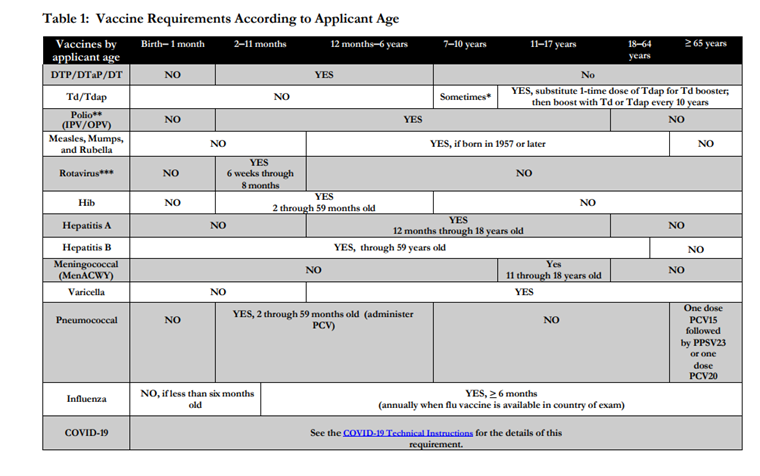Mes examens médicaux sont-ils corrects ?
Click here to read this article in English
Dans le cadre de la procédure de demande d'ajustement de statut (formulaire I-485) ou de la procédure de demande de visa d'immigrant (si le demandeur fait sa demande depuis l'étranger), l'USCIS exige que tous les demandeurs soient correctement vaccinés et que le formulaire I-693 d'examen médical, dûment rempli par un chirurgien civil ou un médecin agréé par l'USCIS, soit soumis à l'USCIS dans une enveloppe scellée.
Malheureusement, de nombreux demandeurs et praticiens de l'immigration sont souvent confrontés à des situations où le chirurgien ou le médecin autorisé n'a pas effectué correctement l'examen médical, ce qui a eu des conséquences préjudiciables pour leur processus d'ajustement, notamment le refus de leur demande de formulaire I-485 ou de leur demande de visa d'immigrant.
Tout d'abord, le chirurgien civil ou le médecin du groupe doit fournir au demandeur une copie des résultats de l'examen médical qui sont mis sous scellés et transmis à l'USCIS. De cette manière, le demandeur et/ou son avocat en droit de l'immigration peuvent consulter et vérifier les résultats avant d'envoyer l'enveloppe scellée à l'USCIS. Cela évitera que des examens médicaux remplis par erreur soient envoyés à l'USCIS et réduira les risques que le formulaire I-485 soit refusé ou qu'il subisse d'autres conséquences négatives en raison d'un examen médical défectueux.
Deuxièmement, le demandeur ou son avocat spécialisé en droit de l'immigration (s'il en a un) doit examiner la copie de l'examen médical qui lui a été remis et s'assurer qu'il est conforme aux exigences de l'USCIS et du CDC en matière de vaccination. Ces exigences peuvent être consultées sur les sites web suivants:
https://www.uscis.gov/tools/designated-civil-surgeons/vaccination-requirements
https://www.cdc.gov/immigrantrefugeehealth/civil-surgeons/vaccinations.html
La loi sur l'immigration et la nationalité (INA)¹ précise que les vaccins suivants doivent être administrés ou effectués dans le cadre de l'examen médical:
- Oreillons, rougeole, rubéole;
- Polio;
- Toxines tétanique et diphtérique;²
- Coqueluche;
- Haemophilius influenza type B; et
- Hépatite B.
- Le CDC exige les vaccins supplémentaires suivants pour les besoins de l'immigration:
- Varicelle;
- Grippe;
- Pneumonie à pneumocoques;
- Rotavirus;
- Hépatite A;
- méningocoque; et
- COVID-19.
Si le demandeur n'a reçu aucun des vaccins énumérés et que les vaccins sont appropriés à son âge et à son état de santé, le demandeur présente une condition de catégorie A et est interdit de territoire. En règle générale, toutes les rangées de vaccins appropriés à l'âge du demandeur doivent comporter au moins une entrée pour que l'on puisse considérer que l'évaluation a été correctement effectuée. Toutefois, la vaccination COVID-19 (exigée à partir du 1er octobre 2021) diffère en ce sens que le demandeur doit compléter toute la série de vaccins (une ou deux doses en fonction de la formulation).³
Afin de déterminer quels vaccins sont "adaptés à l'âge", le chirurgien civil ou le médecin du groupe doit se référer au tableau des besoins en vaccins figurant dans les instructions techniques de vaccination du CDC. Voir ce tableau ci-dessous⁴ :

Si vous avez des questions sur les examens médicaux requis par l'USCIS ou si votre formulaire I-693 a été correctement rempli, veuillez contacter notre bureau pour obtenir de l'aide dès aujourd'hui !
¹ Voir INA 212(a)(1)(A)(ii).
²
Les demandeurs qui ont terminé la série initiale DTP/DTaP/DT ou Td/Tdap doivent recevoir une injection de rappel Td/Tdap tous les 10 ans. Si la dernière dose a été administrée il y a plus de 10 ans, le demandeur doit se faire vacciner, sinon il est interdit de territoire en vertu de l'article INA 212(a)(1)(A)(ii) de la loi américaine sur l'immigration et la protection des réfugiés.
³ Pour plus d'informations, y compris les exigences actuelles en matière de dosage pour l'examen médical des immigrants, voir les CDC Requirements for Immigrant Medical Examinations (exigences des CDC pour les examens médicaux des immigrants) : COVID-19 Technical Instructions for Civil Surgeons (Instructions techniques pour les chirurgiens civils).
⁴ https://www.cdc.gov/immigrantrefugeehealth/civil-surgeons/vaccinations.html
Ce blog n'est pas destiné à fournir des conseils juridiques et rien ici ne doit être interprété comme établissant une relation avocat-client. Veuillez prendre rendez-vous avec un avocat spécialisé en droit de l'immigration avant d'agir sur la base de toute information lue ici.






